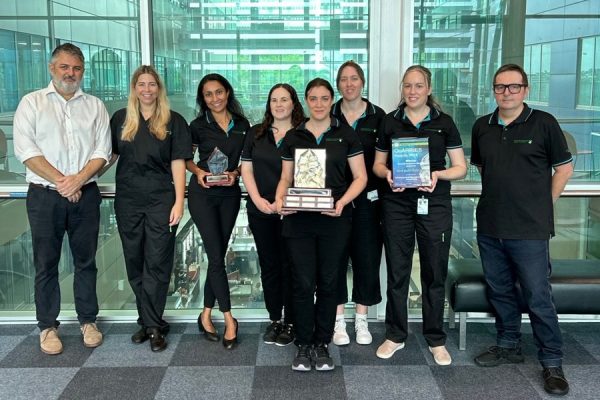Central Foot Hub highlighting the power of collaboration and bridging a critical gap in care

Central Foot Hub team
RBWH’s Central Foot Hub (CFH) is a novel model of care which highlights the power of collaboration and technology in delivering timely, high-quality and cost-effective care, making a meaningful difference in the lives of patients and their families across Central Queensland.
The team’s work was recognised at the recent QuARRIES awards, where they took out the top prize: Overall Winner for Enhancing Rural Specialist Foot Care Accessibility.
In Australia, diabetes-related foot disease (DFD) accounts for over half of all diabetes-related disease burden and contributes significantly to morbidity and disability. Every two hours, an Australian undergoes an amputation due to DFD with up to 80 per cent being preventable.
Currently, it is estimated approximately 300,000 Australians are at risk of DFD, with those living in regional and remote areas experiencing worse clinical outcomes. To address this, four Community Care Foot Hubs were established in Queensland. The hubs aimed to implement evidence-based management for DFD to improve health outcomes by providing timely and co-ordinated specialist clinical care closer to the patient’s home.
The CFH partners with health care workers and their patients across the Central Corridor of Queensland and consists of a Clinical Coordinator, Endocrinologist, Vascular Surgeon, Podiatrist, Psychologist, Social Worker, Infectious Disease Physician and Orthotist.
“What I love most about this model of care is its innovative and patient-centred approach,” said CFH coordinator Amy Walker.
“It’s incredibly rewarding to see the collaboration between local teams and specialists coming together to provide holistic, timely care to patients who might otherwise struggle to access these services.”
Since its launch in February 2024, the Hub has achieved significant outcomes, including over 500 occasions of service, a reduction of interhospital transfers, a reduction in the need for patient time away from home and community, as well as measurable improvements in diabetes management. By co-designing services with local healthcare providers, the Hub is fostering long-term sustainability while bridging a critical gap in care.
“I’m particularly passionate about how this model keeps patients close to home and their communities whenever appropriate, while also fostering strong relationships with colleagues across the region. Together, we’re creating a system that is truly transformative for both patients and healthcare providers alike,” Amy said.
